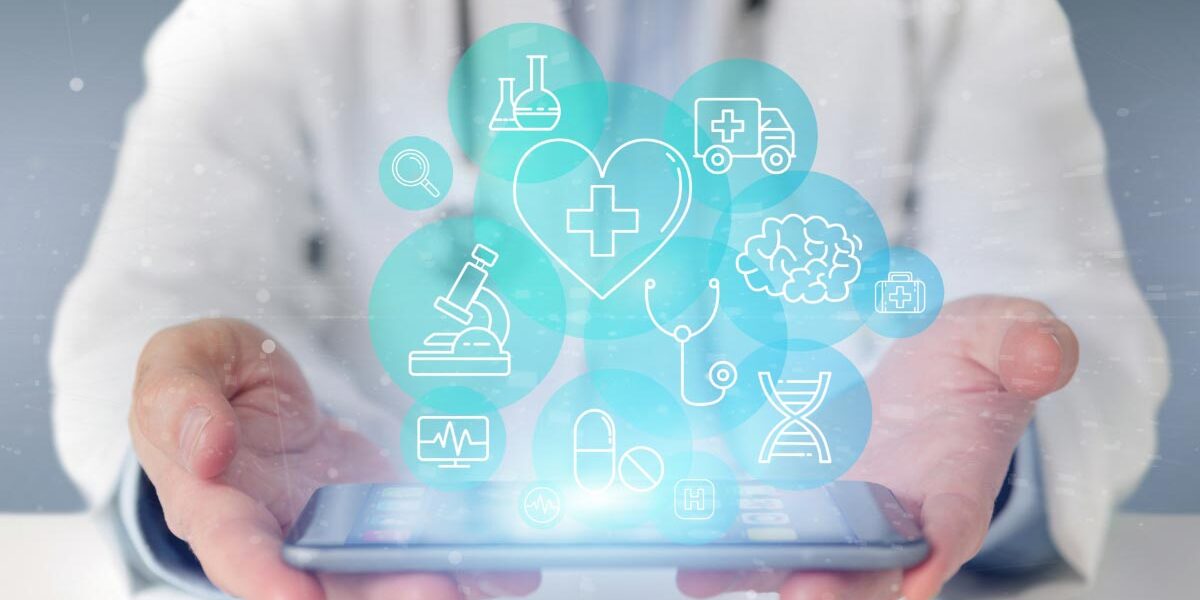Why digital transformation for healthcare
With so many people visiting each health center, these organizations need to implement digital strategies and solutions to deliver comprehensive and timely patient care. Dealing with a large volume of patient data and records, in particular, is difficult (and generally done manually) for most health-related businesses, which influences patient care. Companies must work with seasoned digital transformation services to invest in digital technologies to provide faster and better patient care.
Below are some of the key benefits that health tech offers to the healthcare industry
- Ideal doctor-patient collaboration
- Automated organizational tasks
- Secured data
- Entry to real-time health information
- The connection between numerous healthcare professionals
- Coordinated analyses and research
- The comfort of online appointments
- Enhanced patient management
- Quickly get to managers or nurses throughout medical emergencies
- Management of medicines
- Fewer manual errors
- Supercharged hospital evaluations
- Better payment demand
- Enhanced clinical decisions
So in today’s blog, we are about to comprehend what healthcare technology and IoT solutions guides to, the top healthcare technology trends, and how they assist the healthcare industry.
Advantages
- Enables proactive healthcare
- Keeps patients committed
- Executes multiple processes
- Help healthcare providers and team
- It lets monitors weak patients
Virtual reality for doctors training
Virtual reality and augmented reality have opened up a slew of new possibilities in healthcare. These technologies provide feasible solutions to some of the healthcare system’s most pressing problems and many diversified prospects in areas such as general diagnostics and medical training for power users. AR and VR are two technologies that can provide novel treatments for better patient care.
Benefits
- Psychological relief & treatment
- Data visualization/body mapping/interactive patient information
- Avant-garde diagnostics/risk assessment
- VR surgery run-through
- AR surgery service
- Medical instruction/Training (simulation)
- Doctor consultation
- Trouble navigation
- Highly-effective pain management
- Studying cancer in 3D
- Helping healing from brain injuries
- Promoting social skills for children with autism
- Relieving symptoms of depression
- Assisting veterans with PTSD
- Therapy for phobias
- Early detection of Alzheimer’s disease
- Identifying the early signs of schizophrenia
AI/ML in healthcare
Over clinical decision-making procedures, AI has several advantages for healthcare. AI and machine learning can provide more exact and accurate data to physicians, clinicians, and patients, allowing them to acquire unprecedented insights into diagnosis, care processes, treatment variations, and patient outcomes.
Benefits
- Mind-mapping via brain-computer interfaces
- Creating next-gen radiology tools
- Developing services across growing or underdeveloped regions
- Miscalculating electronic health record use
- Controlling antibiotic resistance risks
- Detailed analytics data for pathology images
- Licensing with brains for medical devices, machines
- Promoting immunotherapy for cancer treatments
- Changing EHR into a potential risk predictor
- Fitness monitoring through wearables tech and personal devices
- Altering selfies into effective diagnostic tools
- Allowing automated and accurate compliance
- Delivering better decision making
- Forecasting future diseases
- Controlling fraudulent billing
On-demand healthcare
Patients today don’t want to wait in hospitals for lengthy periods for fevers or headaches, so they turn to internet platforms for aid. What if they could use the smartphone to create a better healthcare solution? Sounds crazy, huh! Yes, this is why on-demand healthcare services have begun to take off like wildfire.
Benefits
- Comfort
- Smaller healthcare spending & hospitalization
- Efficient exchange with patients
- Less paperwork
- Additional work for doctors
Big data insights
Big data insights may generate significant actions to improve the overall operational efficiency of the healthcare sector, which has a large volume of data such as financial, clinical, R&D, administration, and operational data.
Benefits
- Developed patient care
- Enhanced operational efficiency
- Uncovering the best cure for diseases
- Customized and integrated communication
- Improved access to critical information
- Proactive tools maintenance
Medical wearable devices
The arrival of wearable technology and wearable IoT devices has rocked the medical profession. Next, in addition to the time, you can track the calories burned when sleeping or running by looking at your watch. Isn’t that wonderful? The most significant benefit of employing wearable technology in healthcare is that it allows people to control their health outcomes by providing them with data.
Benefits
- Promotes proactive healthcare
- Keeps patients encountered
- Executes multiple functions
- Help healthcare providers and staff
- It helps monitors vulnerable patients
Robotics in healthcare

Robots assist medical professionals in completing routine chores more quickly, allowing them to focus on more important activities. Medical operations are safer and less expensive for patients due to such automation in healthcare. The ability to perform microsurgery, which is difficult for humans, benefits from using robots in healthcare.
Benefits
- Shorter hospitalization
- Fewer pain and discomfort
- Quicker recovery time and return to practice
- Micro incisions, resulting in reduced risk of infection
- Reduced blood loss and transfusions
- Minimal scarring
- Greater visualization
- Enhanced dexterity
- Greater precision
Telemedicine
Telemedicine is a great option for patients to confuse the space between patient and provider, the key to trustworthy conveyance, fragmentation of respect due to cracks in time borders between charges, and shortage of healthcare providers. A recent survey shows that 90% had already begun creating or executing a telemedicine agenda.
Benefits
- Boosts access to care
- Enhances patient care quality
- Declines healthcare costs
- Enhances patient arrangement/satisfaction
- Improves healthcare service provider satisfaction
- More suitable
- Comprehensive entry to specialist and guiding doctors
Internet of medical things
The Internet of Things (IoT) has begun to influence the Healthcare Industry via smart connected devices, systems, and things utilized by billions of users to leverage data and enable them to make more timely, precise, and contextualized decisions. IoT solutions in the Healthcare industry have unlocked entries for many possibilities.
Benefits
- Lower costs
- Better patient knowledge
- Enhanced drug management
- Decreased errors and waste
- Enhanced treatment outcomes
- Real-time reporting and monitoring
- End-to-end connectivity and affordability
- Managed data and analysis
- Search and alerts
- Remote medical assistance
- Research
Cloud computing
Cloud computing aids healthcare in various ways, including elastic and nearly unlimited scalability, high availability, and data accessible at a low cost.
According to a BCC Research analysis released in January 2018, global spending on cloud computing by all healthcare stakeholders would exceed $35 billion by 2022, growing at a double-digit annual growth rate of 11.6 percent from 2017 to 2022.
Benefits
- High data availability, robust backup, and disaster recovery powers
- Adequate data security, safeguarding from unauthorized access and breaches.
- Proven adherence with regulatory frameworks
- Cooperation
- Artificial Intelligence and Machine Learning
- Data Storage
- Scalability
- Cost
- Security
- Greater sweep, particularly during times of disaster
- Better storage – lower cost
- Better use of big data to treat patients
- Enhanced health research
- Remote patient care
Chatbots
The shortage of competent personnel has hampered the delivery of better patient outcomes, and manual processes in this industry have added to the difficulties.
Leaders in the healthcare industry are turning to various IoT solutions, with medical chatbots being one of the most extensively used. If you’re the CEO of a healthcare business, you’d want to use medical chatbots to help you solve problems and improve patient care.
Benefits
- Provide answers to the FAQs of customers
- Schedule appointments and consultations from anywhere
- Track patients’ care to minimize unwanted appointments and admissions
- Notify patients with prescription refills and care guidelines through alerts and notifications
- Streamline admission, discharge, and transfer requests
- Alert teams during patient emergencies
- Store and update patients’ medical history and records
- Allow the exchange of data from currently disparate health systems
- Automate data entry to reduce artificial errors and duplicate entries
Data science and predictive analytics
Predictive analytics (PA) analyses huge volumes of data using technology and statistical methods to forecast outcomes for individual patients. The data could come from primary treatment outcomes and the most recent medical studies published in prestigious publications and databases.
Benefits
- Increases the accuracy of diagnoses
- Helps with preventive medicine
- Provides physicians with answers for every patient
- Provides staff and hospitals with predictions related to insurance product costs
- Allows researchers to develop prediction models for overtime accuracy
- Select the right hospital and clinic sites
- Optimize staffing levels and improve business operations
- Identify which households are most likely to respond to marketing messages
- Optimize new and existing business markets
- Support long term strategic planning initiative
Bottom Line
That concludes our list of the top healthcare trends for 2022 and beyond. So, given these healthcare trends, are you ready to witness the upcoming healthcare revolution? These new developments have provided healthcare practitioners with powerful and scalable IoT solutions that have enabled them to provide faster and more cost-effective healthcare services through any means possible.
With these changing tendencies, the healthcare business will continue to thrive.




Thank you for your sharing. I am worried that I lack creative ideas. It is your article that makes me full of hope. Thank you. But, I have a question, can you help me? https://accounts.binance.com/de-CH/register-person?ref=53551167